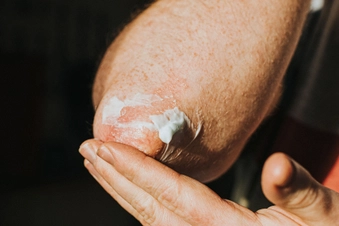Managing Anxiety About Developing PsA

Are You Anxious About PsA?
If you have psoriasis, you might worry you'll get psoriatic arthritis (PsA) too. After all, these inflammatory conditions often go together. Up to 1 in 3 people with psoriasis eventually develop PsA, though inflamed joints may not show up for years. Instead of feeling anxious, be proactive. Here are a few ways to cope and to possibly reduce your risk for PsA in the process.

Get Psoriasis Under Control
Having severe psoriasis makes you more likely to get PsA than having mild disease. Severe means that plaques cover more than 10 percent of your body. Many medicines, including creams, light therapy, and biologics, calm inflamed skin. You'll feel more in control once you've worked with your dermatologist to find a treatment that gives you clearer skin and slows your disease progression.

Commit to Healthy Living
A well-balanced diet and exercise will make you feel better overall, and they'll help trim extra weight. Losing weight might help lower your risk for PsA because fat cells release inflammatory chemicals that contribute to both psoriasis plaques and achy joints. Fill your plate with anti-inflammatory foods like fish, fruits and vegetables, nuts, seeds, and olive oil. And add more movement into your day with a walk, bike ride, or swim.

Cancel Bad Habits
A cigarette or glass of wine might help you cope with worries in the short term. But both habits will increase your anxiety if you rely on them too often. Plus, smoking could make your psoriasis more severe and harder to treat, and it could increase your risk for PsA. Tobacco smoke and alcohol fuel the inflammation that worsens skin plaques and contributes to joint pain. Meditation or yoga are much healthier ways to deal with stress.

Protect Your Joints
If you're at risk for PsA because of your family history, an injury might trigger the disease. Protect yourself with the right gear. Wear a helmet and padding whenever you play sports or ride a bike, scooter, or skateboard. Put on your seatbelt every time you get in a car. And do low-impact exercises like walking or swimming that won't hurt your joints.

Relax
It's normal to feel stressed when you live with one chronic disease (psoriasis) and you're at risk for another (PsA). But stress is definitely not your friend. When you're under stress, your body releases chemicals that boost inflammation and make psoriasis symptoms worse. Calm your body and mind with the relaxation method that works best for you – such as deep breathing, yoga, or a warm bath.

Seek Support
Sometimes your worries can feel overwhelming. Caring for your mental health is just as important as caring for your physical health. If you have trouble coping, reach out for help. Talk to a doctor or nurse. Confide in a trusted friend or close relative. Make an appointment with a therapist, counselor, or other mental health provider. Or join a support group through an organization like the National Psoriasis Foundation.

Watch for Symptoms
The more you learn about PsA, the more prepared you'll be to deal with it in the future. Read about the condition on trusted websites like the National Psoriasis Foundation and the Arthritis Foundation. Be on the lookout for PsA symptoms, which include joint pain and stiffness, swollen fingers and toes, fatigue, and nail changes. Alert your doctor if you notice any of these warning signs.

Ask About Imaging
If you do develop PsA, starting on a biologic drug or other medicine early in the disease can help prevent joint damage and disability. Imaging tests like ultrasound and MRI can detect joint changes long before you notice any swelling or pain. Ask your doctor if you should get these or other imaging tests based on your PsA risk.

Talk to Your Doctor
Relieve your worries by having an honest conversation with your dermatologist or rheumatologist. Ask about your risk of developing PsA and what screening tests could help identify the disease early. Find out what you can do to slow or prevent the progression to PsA. Becoming an active partner in your care will make you feel less anxious and more in control of your health.
Show Sources
IMAGES PROVIDED BY:
- E+/Getty Images
- Moment/Getty Images
- iStock/Getty Images
- Tetra Images/Getty Images
- Moment/Getty Images
- Moment/Getty Images
- E+/Getty Images
- E+/Getty Images
- iStock/Getty Images
- E+/Getty Images
SOURCES:
Cleveland Clinic: "Psoriatic Arthritis."
Johns Hopkins Medicine: "Psoriasis Diet: Foods to Eat and Avoid If You Have Psoriasis."
Journal of Clinical Medicine: "Diagnosis and Intervention in Early Psoriatic Arthritis."
Mayo Clinic: "Psoriasis," "Psoriatic Arthritis."
Mental Health & Prevention: "A Cross-Sectional Study: Association Between Tobacco/Alcohol Usage and Mental Health with Disabilities."
National Psoriasis Foundation: "About Psoriasis," "Life with Psoriasis," "Psoriasis Statistics," "Smoking and Psoriasis," "Support & Community."
Rheumatology (Oxford, England): "Body Surface Area Affected by Psoriasis and the Risk for Arthritis: A Prospective Population-Based Cohort Study."
Rheumatology and Therapy: "Obesity and Psoriatic Arthritis: A Narrative Review."
The Journal of Rheumatology: "Alcohol Intake and Risk of Incident Psoriatic Arthritis in Women."